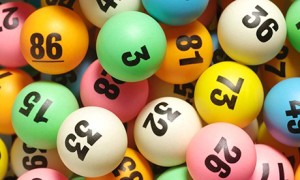 Ok, you psychos – Since it’s CNY, I know about 89.2% of you are thinking of gambling and buying 4D/TOTO.
Ok, you psychos – Since it’s CNY, I know about 89.2% of you are thinking of gambling and buying 4D/TOTO.
There’s just something about this festive period that brings out our inner God of Gamblers. Every year, hundreds of otherwise sensible, rational citizens take out our wallets and throw money at cards, majong tiles and yes, lottery tickets.
So let’s talk about playing the lottery. Most personal finance pundits will hear the word “lottery”, and then immediately start wagging their fingers and say things like,
- “It’s a fools game!”
- “The odds are too small for you to make any money!”
- “You’ll have a negative expected value!”
Yes, it’s true – You have shitty odds of winning the lottery. If you were smart, you’d put your money somewhere more worthwhile, like investing.
But hey, let’s get real here. You guys are STILL gonna take part in the upcoming Hong Bao Lucky Draw this CNY, regardless of whatever we nerdy personal finance bloggers have to say.
So heck it, if you’re gonna play anyway, I might as well tell you how to increase your expected value of playing the lottery.
The Rules
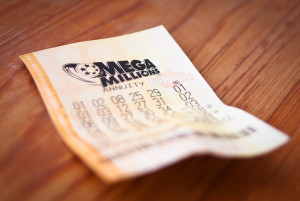
For the sake of simplicity, let’s talk about playing the simplest version of Toto: The Ordinary Bet.
The Ordinary Bet involves picking 6 numbers between 1 and 49. If all your numbers match the 6 winning numbers drawn, you win the Jackpot. There are other smaller prizes if you match 5, 4, or 3 of the winning numbers.
Here’s a crucial rule that’ll determine how we play the lottery: Winners who pick the same numbers split their prizes.
(Okay, I’ve bought Toto for a grand total of maybe 3 times in my entire life, so please correct me if these rules are wrong. I got the info from the Singapore Sweep website.)
The Wrong Ways To Play
First, let’s talk about the wrong ways to play
- The “Anyhowly Pick Numbers” Method: “Aiyah, I feel lucky today, just tikam-tikam* lah!”
- The “Pick Significant Numbers” Method: “Ok must always pick my birth year, and the fortune teller says must pick 42, and I’ll also buy the number of times I had to pee today.”
- The Pseudo Toto System Method: “Ok, 37 didn’t come out for the last 15 draws. CONFIRM WILL COME OUT FOR THIS ONE!”
Of the three, The Pseudo Toto System Method is the worst approach, because it gives people the illusion that they have some sort of strategy when they have none. (Hey – doesn’t that sound like market timing?) There are even websites out there selling software which analyse the “patterns” of winning numbers in the past.
The Anyhowly Pick Numbers and the Pick Significant Numbers Methods aren’t much better either, for a very simple reason: Everyone picks the same numbers.
Let’s take birthdays for example. Since many people like to pick their birthdays, that leads to more of the lower numbers being picked (e.g. 1 to 31).
Or let’s take popular numbers – those that feature prominently in shows or (morbidly) car accidents. For example, two episodes of the TV Show Lost had one of the characters picking the numbers 4, 8, 15, 16, 23 and 42 in a lottery. This led to thousands of people in the US picking the same numbers over the season. On 4 Jan 2011, the numbers 4, 8, 15 and 42 came up in the US lottery, which gave the winners $150 each – a pathetic payoff considering the extremely low odds of winning.
When you pick the same numbers as everyone else, you’ll have to split the pot with everyone else. Not a good strategy.
Why Popularity Is Bad
The math behind the lottery is this: Expected value = expected payoff x odds of winning
The odds of winning the first prize in Toto are 1 in 13,983,816. Nobody can influence this (as much as fortune tellers and lotto software tell you), so the best we can do is maximise our expected payoff.
To do this, you wanna make sure that you pick numbers that are LESS popular among bettors. Lottery research shows that:
- People like smaller digits – especially since they coincide with significant dates
- People like the number “7” – this was chosen almost 50 percent more than average
Well, what if you simply avoided the above numbers and picked the rest? Not so easy. For example:
- People who picked smaller digits like a birthday, will still have 3-4 numbers left. So they might try to “balance out” by picking a larger number for the remaining numbers
- Most people think that “13” is unpopular, yet it paradoxically gets chosen a lot too – looks like a lot of people are trying out some reverse psychology on Luck.
The lesson here is this: Everyone thinks that they’re being a contrarian, but in reality they’re all just picking the same numbers (Hey: Doesn’t that remind you of stock-picking?)
So instead of trying to outguess which numbers are “better” than others, what’s the next best alternative?
Embrace Randomness
There’s an option in TOTO known as “Quick Pick” – where the Toto system will simply generate 6 random numbers for you to bet on.
Many people don’t like Quick Pick. It’s unappealing – because we all want to pick the numbers ourselves. WE are the Masters of our Fate! WE decide which numbers will make us millions!
Quick Pick takes the control away from us, yet, counterintuitively, it gives us a better expected payoff because it’s more likely to generate UNPOPULAR numbers. As William Poundstone wrote in the book Rock Breaks Scissors (aff):
The conscious choosers unknowingly gravitate to the same fifteen to twenty popular numbers. The random pickers usually have more unpopular numbers because most numbers are not popular.
As I’ve been hinting throughout this post, Quick Pick is a lot like index investing (although the latter has much, much, much better odds).
When we invest in indexes, we cede control of our investments to the market. It sounds dumb – almost blasphemous – that we should let “the market” decide our fortunes.
Yet, when we look at the data, the evidence is irrefutable: People who try to pick stocks or time the market are extremely unlikely to beat the market. On the other hand, GIVING UP control makes it more likely for us to come out profitable.
The Strategy
So, putting whatever we learnt together, here’s the counterintuitive strategy I put together on how to play Singapore TOTO:
- Generate a list of random numbers. You can use Excel, or the Random Number Generator from the Toto site. Or if this is too much hassle, just go for Quick Pick.
- Make sure that your numbers don’t coincide with significant numbers – like those that appear on a TV show or in the news
- Make sure that your numbers don’t form a pattern like a straight line or a diagonal on the TOTO slip – indecisive bettors tend to pick numbers which form a line or another pattern
You might notice that this isn’t an earth-shattering method of beating the lottery. If we look at the odds, chances are, buying TOTO won’t make you a millionaire next week.
However, in the off-chance that your numbers DO get selected (and it’s entirely possible, just improbable), then this method helps you to minimise the chance that you’ll have to split the pot with thousands of other people, so you can keep more of your winnings.
In that scenario, remember that a certain personal finance blogger out there who helped you out. Maybe you should return the favour.
In any case, here’s to a happy and prosperous Year of the Goat ahead. Do awesome work, give generously, and “meh” the Huat be with you!
Image credit: Conspiracy of Words, Robert S Donovan, Ronn ashore, superlekker, wili_hybrid, Lisa Brewster
Sources: Rock Beats Scissors by William Poundstone
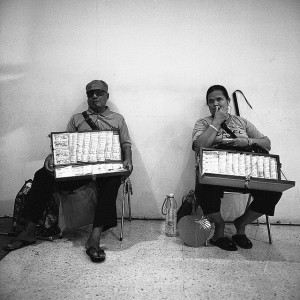

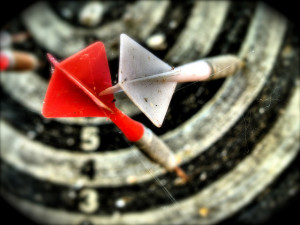
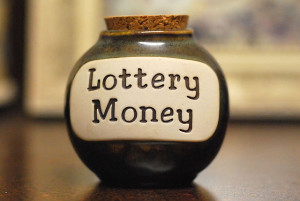

It doesnt tell the mathematical formula or basis from machine to the planned or random fall of the toto balls